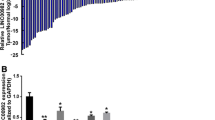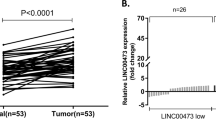Abstract
Background
Previous studies have indicated that the dysregulation of long non-coding RNAs plays an important role in tumors. LINC01503 is a newly discovered lncRNA that promotes development of various tumor types. However, the function of LINC01503 in gastric cancer has not been reported yet.
Aims
To explore the function of LINC01503 in gastric cancer development and the underlying molecular biological regulatory mechanisms.
Methods
LINC01503 expression in tissues and cell lines of gastric cancer were determined through qRT-PCR. Transwell assay and cell number counting experiments were employed to detect the cell invasion and proliferation. C-myc, cyclin D1, and β-catenin expressions were analyzed through Western blot and qRT-PCR.
Results
LINC01503 was highly expressed in gastric cancer tissues and cell lines, which was correlated with poor prognosis. Knockdown of LINC01503 suppressed gastric cancer cell proliferation and invasion, whereas overexpression of LINC01503 showed a reverse trend. Silencing LINC01503 significantly inhibited the expression of c-myc, cyclin D1, and β-catenin. Overexpressing β-catenin rescued the inhibitory effects, induced by LINC01503 silencing, on gastric cancer cell proliferation and metastasis.
Conclusions
This research reported that the elevated expression of LINC01503 could promote proliferation and metastasis of gastric cancer through positively regulating the Wnt/β-catenin pathway.





Similar content being viewed by others
References
Karimi P, Islami F, Anandasabapathy S, Freedman ND, Kamangar F. Gastric cancer: descriptive epidemiology, risk factors, screening, and prevention. Cancer Epidemiol Biomark Prev. 2014;23:700–713. https://doi.org/10.1158/1055-9965.EPI-13-1057.
Nie Y, Wu K, Yu J, et al. A global burden of gastric cancer: the major impact of China. Expert Rev Gastroenterol Hepatol. 2017;11:651–661. https://doi.org/10.1080/17474124.2017.1312342.
den Hoed CM, Kuipers EJ. Gastric cancer: how can we reduce the incidence of this disease? Curr Gastroenterol Rep. 2016;18:34. https://doi.org/10.1007/s11894-016-0506-0.
Ang TL, Fock KM. Clinical epidemiology of gastric cancer. Singap Med J. 2014;55:621–628.
Zhao EH, Ling TL, Cao H. Current status of surgical treatment of gastric cancer in the era of minimally invasive surgery in China: opportunity and challenge. Int J Surg. 2016;28:45–50. https://doi.org/10.1016/j.ijsu.2016.02.027.
Allemani C, Matsuda T, Di Carlo V, et al. Global surveillance of trends in cancer survival 2000-14 (CONCORD-3): analysis of individual records for 37 513 025 patients diagnosed with one of 18 cancers from 322 population-based registries in 71 countries. Lancet. 2018;391:1023–1075. https://doi.org/10.1016/S0140-6736(17)33326-3.
Kumar MM, Goyal R. LncRNA as a therapeutic target for angiogenesis. Curr Top Med Chem. 2017;17:1750–1757. https://doi.org/10.2174/1568026617666161116144744.
Valadkhan S, Gunawardane LS. lncRNA-mediated regulation of the interferon response. Virus Res. 2016;212:127–136. https://doi.org/10.1016/j.virusres.2015.09.023.
Peng WX, Koirala P, Mo YY. LncRNA-mediated regulation of cell signaling in cancer. Oncogene. 2017;36:5661–5667. https://doi.org/10.1038/onc.2017.184.
Lu SR, Li Q, Lu JL, Liu C, Xu X, Li JZ. Long non-coding RNA LINC01503 promotes colorectal cancer cell proliferation and invasion by regulating miR-4492/FOXK1 signaling. Exp Ther Med. 2018;16:4879–4885. https://doi.org/10.3892/etm.2018.6775.
Xie JJ, Jiang YY, Jiang Y, et al. Super-enhancer-driven long non-coding RNA LINC01503, regulated by TP63, is over-expressed and oncogenic in squamous cell carcinoma. Gastroenterology. 2018;154:2137–2151. https://doi.org/10.1053/j.gastro.2018.02.018.
Wang H, Sheng ZG, Dai LZ. Long non-coding RNA LINC01503 predicts worse prognosis in glioma and promotes tumorigenesis and progression through activation of Wnt/beta-catenin signaling. Eur Rev Med Pharmacol Sci. 2019;23:1600–1609. https://doi.org/10.26355/eurrev_201902_17119.
Nusse R, Clevers H. Wnt/beta-catenin signaling, disease, and emerging therapeutic modalities. Cell. 2017;169:985–999. https://doi.org/10.1016/j.cell.2017.05.016.
Gammons M, Bienz M. Multiprotein complexes governing Wnt signal transduction. Curr Opin Cell Biol. 2018;51:42–49. https://doi.org/10.1016/j.ceb.2017.10.008.
Krishnamurthy N, Kurzrock R. Targeting the Wnt/beta-catenin pathway in cancer: update on effectors and inhibitors. Cancer Treat Rev. 2018;62:50–60. https://doi.org/10.1016/j.ctrv.2017.11.002.
Zhan T, Rindtorff N, Boutros M. Wnt signaling in cancer. Oncogene. 2017;36:1461–1473. https://doi.org/10.1038/onc.2016.304.
Li R, Liu B, Gao J. The application of nanoparticles in diagnosis and theranostics of gastric cancer. Cancer Lett. 2017;386:123–130. https://doi.org/10.1016/j.canlet.2016.10.032.
Yang L, Wang J, Li J, et al. Identification of serum biomarkers for gastric cancer diagnosis using a human proteome microarray. Mol Cell Proteomics. 2016;15:614–623. https://doi.org/10.1074/mcp.M115.051250.
Polakis P. Wnt signaling in cancer. Cold Spring Harb Perspect Biol. 2012;. https://doi.org/10.1101/cshperspect.a008052.
Zarkou V, Galaras A, Giakountis A, Hatzis P. Crosstalk mechanisms between the WNT signaling pathway and long non-coding RNAs. Noncoding RNA Res. 2018;3:42–53. https://doi.org/10.1016/j.ncrna.2018.04.001.
Funding
None.
Author information
Authors and Affiliations
Corresponding author
Ethics declarations
Conflict of interest
The authors declare that they have no conflict of interest.
Additional information
Publisher's Note
Springer Nature remains neutral with regard to jurisdictional claims in published maps and institutional affiliations.
Electronic supplementary material
Below is the link to the electronic supplementary material.
Rights and permissions
About this article
Cite this article
Ding, J., Shi, F., Xie, G. et al. Long Non-coding RNA LINC01503 Promotes Gastric Cancer Cell Proliferation and Invasion by Regulating Wnt Signaling. Dig Dis Sci 66, 452–459 (2021). https://doi.org/10.1007/s10620-020-06215-4
Received:
Accepted:
Published:
Issue Date:
DOI: https://doi.org/10.1007/s10620-020-06215-4




